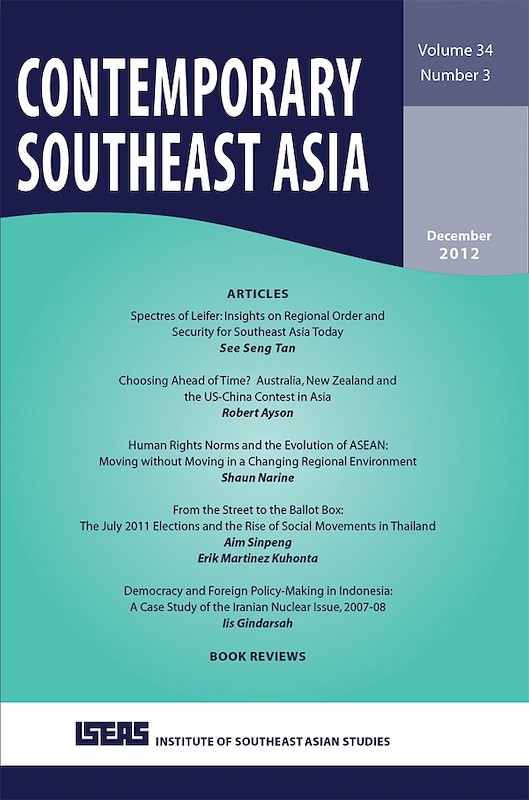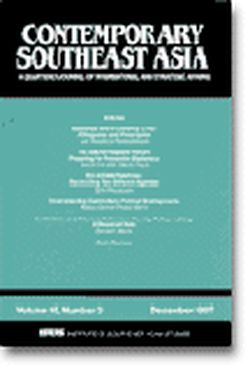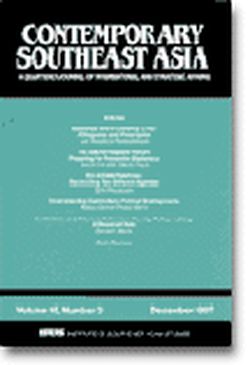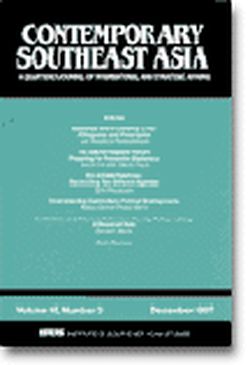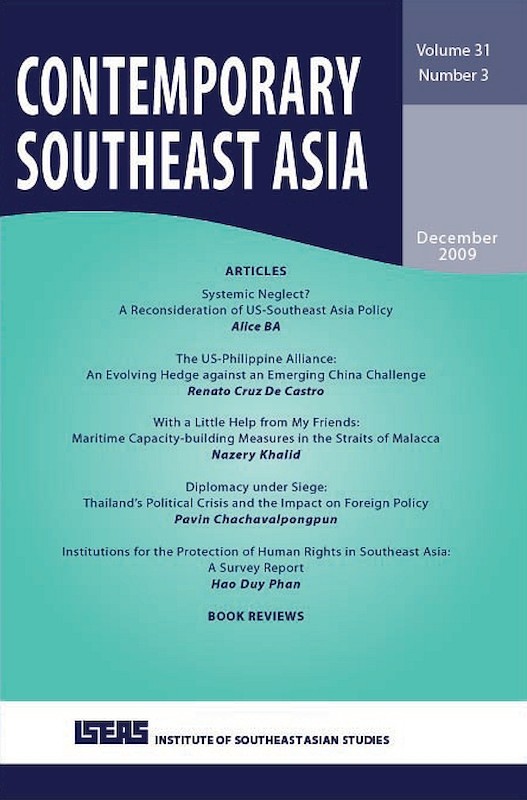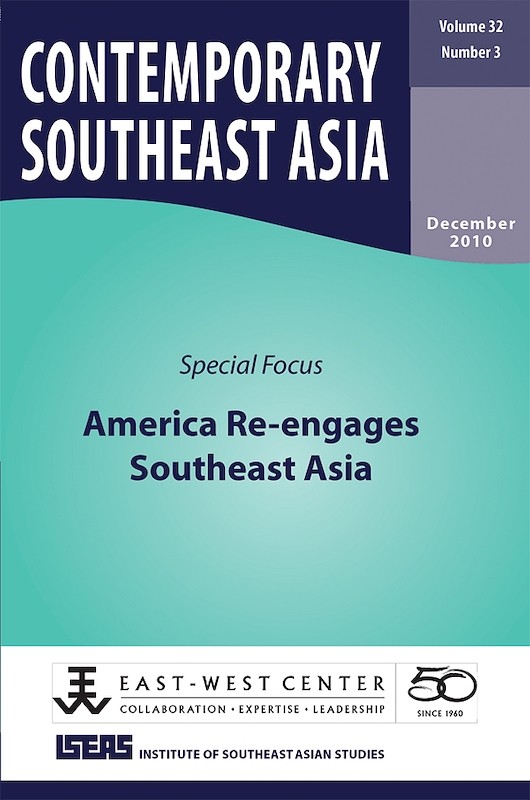Contemporary Southeast Asia: A Journal of International and Strategic Affairs Vol. 15/4 (Mar 1994)
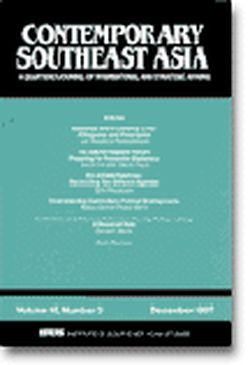
Date of publication:
March 1994
Number of pages:
145
Code:
CS15/4
Contents
-
Preliminary pages
- ARTICLES
-
Assessing Australia's Southeast Asian Strategy, by Thomas Durell Young, author see abstractAustralia is fundamentally altering its foreign and defence policies towards Southeast Asia, so as to ameliorate its diplomatic position and overall security posture in the region. These efforts, while perhaps ignored outside the immediate region, constitute while perhaps ignored outside the immediate region, constitute a significant reorientation in Australia's external affairs. In addition to acknowledging that Canberra must be prepared to defend itself without allied assistance, this diplomatic initiative and new national strategy underscore the inherent limitations Australia faces to act unilaterally in Southeast Asia. This article argues that this is a sound policy. Notwithstanding the maintenance of certain Cold War allied operational arrangements, the Australian Defence Force is undergoing a significant reorientation, although structural limitations could prevent it from conducting sustained operations in the north. None the less, what needs to be understood is that this new northward focus is tempered by the reality that, given the growing sophistication in regional defence capabilities, it is extremely unlikely that Australia would engage in independent combat operations, outside national defence.
-
Indochina's Prospects for Stability, by Ky Cao, author see abstractIn the aftermath of a successful U.N.-supervised general election in Cambodia, Vietnam's continued pursuit of a domestic liberalization policy and the increasingly positive overtures mode by ASEAN, China and the United States to Hanoi have combined to reinforce the perception that a brighter outlook for Indochina is at hand. This article argues that there remain significant political historical complexities that could threaten this outlook in the longer term. An assessment of Vietnam's geopolitical history highlights the geostrategic obstacles to Indochina's stability, growth and development. The article suggests one way of resolving these longstanding problems: the federalization of the Indochinese states.
-
Cambodia since the Election: Peace, Democracy and Human Rights?, by Terence Duffy, author see abstractThis article examines the recent political and social context of Cambodian experience and relates it to Cambodia's tragic human rights legacy. It explores the salience of the Cambodian "killing fields" in popular memory and juxtaposes this with the operations of UNTAC's Human Rights component. The idea of promoting a culture of human rights in this unlikely environment is discussed and related to measures of human rights education, social justice, and improvements in civil society which will be continued by the United Nations and other organizations in the years to come. Ultimately, it is argued that UNTAC has had a profound impact on Cambodian society and that the prospects for increasing respect for human rights are good in the years ahead.
-
The Future of the Khmer Rouge: Internal and External Variables, by Zachary Abuza, author see abstractWhile most people are looking to the conclusion of the round-table negotiations over the inclusion of the Khmer Rouge in the Royal Government of Cambodia, there are several internal and external variables that must be considered in determining their future. The internal factors are, first, the degree of factionalism within the Party of Democratic Kampuchea (PDK) based on political, ideological, regional, economic and generational differences; second, leadership succession; and third, the continued willingness of the National Army of Democratic Kampuchea (NADK) to fight and the population's willingness to support the resistance movement. This third factor will be directly influenced by external variables, the most important ones being the degree of factionalism within the new government and the unified Cambodian Armed Forces (CAF); the amount of foreign aid, including foreign military assistance; the successful implementation of economic development plans, especially a rural reform programme; the continued presence of Vietnamese settlers in Cambodia; and the degree of international support and co-operation, especially that provided by Thailand and China.
-
A Short Note on ASEAN-Great Power Interaction, by Lam Lai Sing, author see abstractPerceiving China to be more of a long-term regional threat than a "good neighbour", the ASEAN states have asked the United States to maintain a military balance in the Asia-Pacific region, much against the new Dengist policy of treating the United States as its primary enemy. Although sharing China's views of "the resurgence of Japanese militarism", each of the ASEAN members has had a different attitude towards Japan's attempt to secure a bigger political role in the region. Moreover, concentrating its efforts on curbing "US hegemonist" influence there, China has neglected Japan, the secondary enemy of the neo-Maoist First World. Japan itself is on its way to securing a vital role in the management of regional affairs.
-
Potential Areas of Chinese Regional Military Separatism, by Peter Yu Kien-Hong, author see abstractThis article attempts to analyse Chinese regional military separatism (RMS) from a Military Region (MR) commander's perspective. Eight major contexts are examined, and both pro and con arguments are advanced. It is argued that while small-scale regional military separatism is possible in what the Chinese call sanbuguandidai (no man's land), it would likely be an infrequent phenomenon and come in a size no larger than a county.
- BOOK REVIEWS
-
BOOK REVIEW: Peacekeeping: Challenges for the Future edited by Hugh Smith, by Kenneth Christie, author
-
BOOK REVIEW: Arms Control in the Post-Cold War: With Implications for Asia/Pacific edited by Trevor Findlay, by Denny C Roy, author
-
BOOK REVIEW: Vietnam - The Politics of Bereaucratic Socialism by Gareth Porter, by Russell Hiang-Khng Heng, author

